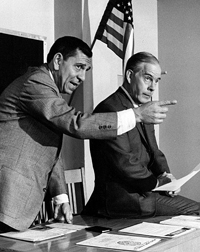
Source: Jack Webb Harry Morgan Dragnet 1968, NBC Television, Wikimedia
Have you ever heard the phrase “just the facts, ma’am”? It’s from a 1950s TV show called Dragnet. The quote is Sergeant Friday’s tagline that he said in every episode. “Just the facts, ma’am” meant “Don’t bother me with any of your opinions. Just give me the facts so we can investigate this crime.” Much of Sergeant Friday’s ability to do his job successfully (catch the bad guy) hinged on his ability to distinguish fact from opinion. The same can be said of your job as the writer of a persuasive text. You need to know fact from opinion both in writing your own side of an issue (your evidence) as well as in anticipating the views of others (counterarguments).

Source: Take A Look ...item 1.., marsmet543, Flickr
What is a fact? A fact is a statement that can be proved. You can prove it yourself, or you can use a credible source.
| Statement of fact | Source of proof |
|---|---|
| Woodrow Wilson was President. | History book |
| Mr. Tulke teaches math. | Experience |
| Josie won the election. | Number of votes |
| Your room is 10-feet wide. | Measurement |

Source: Balanced debate, Justina Kochansky, Flickr
What is an opinion? An opinion cannot be proved. It’s based only on someone’s thoughts, feelings, or judgments. Here are a few examples of opinions:
- Taxes are too high.
- Owning a fast car makes you more popular.
- Mr. Tulke doesn’t give enough homework.
Some opinions, however, can be considered more sound than others. They cannot be proven, but they can be backed up with facts. The task then becomes differentiating facts that can be deemed reasonable and logical from statements that, in the last analysis, are only someone’s considered opinion. The student who believes that Mr. Tulke does not give enough homework can give you facts to back up that assertion, but how much of the statement springs from the student’s personal feelings about the nature of homework and its place in public education? In the final analysis, it cannot be proved that Mr. Tulke doesn’t give enough homework.
How does this relate to the topic of writing a successful persuasive text? First, you must distinguish fact from opinion to make sure your position is based entirely on fact. Second, if you know the difference between fact and opinion, you will be able to refute a counterargument that appears to be true but is not. Differentiating between fact and opinion is crucial to a sound argument. Knowing the difference will also help you see the fallacies in the views of others.
Let’s review your understanding of fact and opinion. Choose the correct word for each statement from each drop-down box.


Source: Decisions, Richard Scott, Flickr
Sometimes, it’s hard to decide whether a statement is a fact or an opinion, especially when an opinion is attached to a fact. In this case, the opinion is sometimes there to fool the reader into thinking that what’s being said is a fact. You must become a careful reader to distinguish opinions from facts.